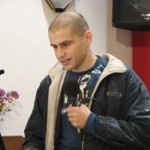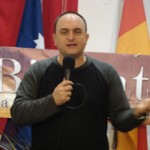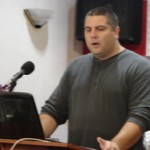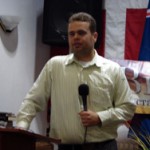Speaking at the Annual Conference of the Bulgarian Christian Student Union in Lyaskovets
 On October 25, 2009 after ministering in the morning service of the Gabrovo Church of God, we traveled to Lyaskovets near Veliko Tarnovo to minister at the annual national conference of the Bulgarian Christian Student Union. The main speaker of the conference was the National Student Coordinator of the Macedonian movement, Nicolas Galevska. Other speakers included, Dr. Benjamin Peev, Zefian Nicholas from Albania, Petyo Valkov, Trife Trifonov and Dr. Dony Donev.
On October 25, 2009 after ministering in the morning service of the Gabrovo Church of God, we traveled to Lyaskovets near Veliko Tarnovo to minister at the annual national conference of the Bulgarian Christian Student Union. The main speaker of the conference was the National Student Coordinator of the Macedonian movement, Nicolas Galevska. Other speakers included, Dr. Benjamin Peev, Zefian Nicholas from Albania, Petyo Valkov, Trife Trifonov and Dr. Dony Donev.
Dr. Donev spoke on “ChristSpace: How to Revolutionize the Internet for Christ”. The well attended session covered various topics on how to minister using the internet with special focus on the growing influence of the social networking movement and upcoming release of Google Wave. A time for questions and answer was left as a round table discussion at the end of the meeting. All present were given a souvenir ring with our website “Bibliata.TV” and encouraged to create and upload their Christian videos to this site using any camera capabilities they may have. We are thankful for the local church team who attended and filmed the event, for their work is essential for the future development for the newly started Church of God congregation in Veliko Tarnovo, where we ministered also before leaving.
Convention 24: Using the Internet in Bulgarian Ministries
 On the 24th of October, 2009 in the city of Gabrovo, Cup and Cross along with Vasil Petrov Ministry organized the Bulgarian Ministries on the Internet Convention. It consisted of a one-day specialized training for using the Internet in the ministry for pastors, ministers and their teams. The invitation for the conference was sent out to all churches across the country and the cities of Veliko Ternovo, Sevlievo, Gabrovo, Rousse, Varna, Yambol, Dimitrograd, Kurdjali, and Sofia responded representing the north-central, central, north-eastern, south-eastern, southern, and western parts of Bulgaria.
On the 24th of October, 2009 in the city of Gabrovo, Cup and Cross along with Vasil Petrov Ministry organized the Bulgarian Ministries on the Internet Convention. It consisted of a one-day specialized training for using the Internet in the ministry for pastors, ministers and their teams. The invitation for the conference was sent out to all churches across the country and the cities of Veliko Ternovo, Sevlievo, Gabrovo, Rousse, Varna, Yambol, Dimitrograd, Kurdjali, and Sofia responded representing the north-central, central, north-eastern, south-eastern, southern, and western parts of Bulgaria.
The first of these meetings was held in the building of the Bulgarian Church of God El Bethel from 10:00 am until 4:00 pm and was offered free of charge to all participants. Speakers from Varna and Sofia were also invited to participate in the course to discuss topics including 1) Ministry benefits of the Internet, 2) How to transmit live worship through uStream.TV, 3) National Evangelical Internet Network (NEIM), 4) the use of Google Wave in the ministry, 5) Blogging for churches and pastors and finally 6) Public relations via the Internet and the Day of Open Doors in Bulgaria
This event was broadcasted live and watched by many more across the country and abroad. The pre-released unedited footage of the lectures has already been viewed by over 400 people on our website Bibliata.TV. We are expecting the editors cut of the convention to be ready for release by the beginning of November.
The Story of the Bulgarian Bible
Published in the Bulgarian National Geographic
The March issue of the Bulgarian National Geographic featured an article about the Bulgarian Bogomils – a medieval Bulgarian sect that split from the Orthodox Church forming its own religious community with peculiar customs. The author of the article, the renowned Bulgarian journalist Lubormir Kiumurdjiev, interviewed a number of Bulgarian theologians in an effort to investigate the Christian roots of the Bogomil’s theology. The view of the Bulgarian protestant community was represented in the article by Dr. Dony K. Donev, who elaborates on two main points in the faith of the Bogomils namely, their purposeful simplification of liturgy, as a sign of proto-reformation theology within the context of the Eastern Orthodox Church and their continuous efforts toward a new literal Bible translation in the spoken Bulgarian vernacular of their times.
The National Geographic’s publication comes as a high recognition of long years of hard labor in the publication of three biweekly series. Two of them are still ongoing with the Bulgarian Evangelical Newspaper as one tells the story of Bulgarian Protestantism, and the other focuses on chronological paleographical examination of Biblical manuscripts, in comparison of versions and revisions of the Bulgarian Bible. The third one is published in the Pentecostal Evangel and is almost finished with the examination of early Bulgarian Pentecostal history, while many of its findings will be presented at the 2010 SPS meeting.
Bulgarian Video Bible
 Cup & Cross Ministries is proud to announce the beginning of a new media project entitled Bulgarian Video Bible. The project purposes the production of a Bulgarian language Bible in video format. The project is hosted by the Bibliata.TV video website also directed and administered by Cup & Cross team members.
Cup & Cross Ministries is proud to announce the beginning of a new media project entitled Bulgarian Video Bible. The project purposes the production of a Bulgarian language Bible in video format. The project is hosted by the Bibliata.TV video website also directed and administered by Cup & Cross team members.
The video website was released in September, 2008 to promote Christian education and spiritual upbringing through creative arts and new technologies. For the past several months it has become a dynamic internet community for Christians in Bulgaria and abroad. The project will be presented at the upcoming BibleTech 2009 conference organized by Logos Bible Software with which Cup & Cross Ministries have partnered in various Bible study related projects.
The first Bulgarian Video Bible is expected to be released by 2010. The completed modules of the projects can be viewed now at: http://video.bibliata.tv/
National Leadership Seminar for the Bulgarian Church of God Continues
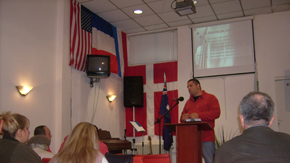 Levels 3-5 of the Leadership Seminar were presented on Saturday afternoon in the Gabrovo Church of God. The following topics were covered: 21 Laws of Leadership from a Biblical Perspective, 52 Leadership Principles of Jesus and 17 Laws of Teamwork for Churches. Plans have been made for the seminar to be held in Bourgas, Sofia, Samokov and Russe.
Levels 3-5 of the Leadership Seminar were presented on Saturday afternoon in the Gabrovo Church of God. The following topics were covered: 21 Laws of Leadership from a Biblical Perspective, 52 Leadership Principles of Jesus and 17 Laws of Teamwork for Churches. Plans have been made for the seminar to be held in Bourgas, Sofia, Samokov and Russe.
On Sunday we delivered a message entitled 10 Signs of the Last Days. This is a sermon accompanied by a powerful media presentation that informs of recent developments in Bible Prophecy and urges believers to prepare and stay ready for the final hour of Biblical eschatology.
After the morning service, we traveled south to meet with pastors in Kazanlak and Stara Zagora and reached the city of Dimitrovgrad located South of the Balkan Range. We were invited to speak to the hundreds of young people from Bulgaria, Ukrain, Russia and Molodva who had gathered there for a youth rally. As planned and expected we announced the release of the newest of our ministry websites – a GodTube like web community called Bibliata.TV.
Leadership Seminar for the Bulgarian Church of God
 A month ago, Cup & Cross Ministries visited the Samokov congregation pastored by Church of God National Overseer Alexander Todorov. Our team then left for the Salvation Church of God in the capital Sofia, to hold the first level of the Church Leadership Seminar. We have worked on this course for the past two years and designed it to serve as a tactical ministry training element in our national strategy for Church of God congregations. The first module included topics such as:
A month ago, Cup & Cross Ministries visited the Samokov congregation pastored by Church of God National Overseer Alexander Todorov. Our team then left for the Salvation Church of God in the capital Sofia, to hold the first level of the Church Leadership Seminar. We have worked on this course for the past two years and designed it to serve as a tactical ministry training element in our national strategy for Church of God congregations. The first module included topics such as:
(1) The leadership principles of Jesus
(2) Recognition, training and personal qualifications of a successful leader
(3) The principles of God’s timing
(4) Sacrifice, responsibility, investment and delegation
(5) The law of sowing and reaping
(6) The law of navigation
(7) Problem solving
(8) Psalm 23 for leaders
Subsequently, we released on the internet a 34-part series called the Successful Leader. Immediately after we held the course in Sofia, we began receiving invitations to hold the course in various locations in Bulgaria. As a result, we scheduled the first level of the leadership course with the churches in Sliven, Bourgas, Rousse and began planning its future presentation with the churches in Gabrovo, Yambol, and Samokov. We will be then returning to Samokov and Sofia in September to teach the second level of the Church Leadership Course in the Church of God congregations there.
New Bulgarian Translation of the Bible Released
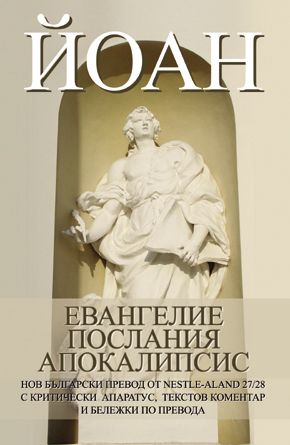 Cup & Cross Ministries has released a new translation of the complete Johannine works (the Gospel, Epistles and Revelation) for the Bulgarian Easter on April 27, 2008.The final result of this project is a 90-page book including Bulgarian literal translation from the Greek originals NA 27/28, critical apparatus, textual commentary and translators notes. The book is successful in its purposes to provide a literal translation in the Bulgarian vernacular, exact preservation of the word order from the original text, translation of the Greek grammatical forms, as well as the Hebrew and Aramaic linguistic uniqueness of the text and a preservation of the original parts of speech and verb tenses. Read more
Cup & Cross Ministries has released a new translation of the complete Johannine works (the Gospel, Epistles and Revelation) for the Bulgarian Easter on April 27, 2008.The final result of this project is a 90-page book including Bulgarian literal translation from the Greek originals NA 27/28, critical apparatus, textual commentary and translators notes. The book is successful in its purposes to provide a literal translation in the Bulgarian vernacular, exact preservation of the word order from the original text, translation of the Greek grammatical forms, as well as the Hebrew and Aramaic linguistic uniqueness of the text and a preservation of the original parts of speech and verb tenses. Read more
Bulgarian Churches in North America: Contextual Assessment
After awaking in the morning of the 21st century, the world was rapidly introduced to a new postmodern movement called globalization. At a top political and economic level, globalization is the process of denationalization of markets, politics and legal systems purposing the implementation of a global economy. However, globalization is much more than an economic event as it affects social status and human rights of people worldwide. For the world community the process of globalization is a process of internationalization describing cross-border relations between countries, growth in international exchange and interdependence. It is also viewed as a liberalization process of removing government-imposed restrictions on movements between countries in order to create a borderless world. Globalization further implements spreading various objects and experiences to people at all corners of the earth creating universalization. In a cultural context, globalization is often seen as Westernization of the world. Finally, globalization carries the meaning of deterritorialization – reconfiguration of geography reforming any social place in new terms of independent territory, distance and borders.
Since the church is a global event, inevitably this process affects the community of believers. The “global believer” seeks to connect with people of similar nature independent of race, location and social status. Thus, church mission and church ministry reclaim its original Biblical global perspective. In this process, the church of postmodernity is liberated from its nationality and reaches toward internationalization establishing a new multicultural identity with a global perspective and mission. As a result multicultural churches gain a contextual new function serving as identity sources. Such is the case with the network of Bulgarian churches in North America.
Established to unite all Protestant Bulgarian churches in North America, it reaffirms the participation of Bulgarian immigrant communities in the global multicultural ministry. This present contextual assessment will explore the process of establishing a network of Bulgarian churches in Northern America. Read the complete paper (PDF)
Bulgarian Chaplaincy Associations Recognized by U.S. Department of State
 BREAKING NEWS [October 8, 2007]
BREAKING NEWS [October 8, 2007]
Original source: U.S. Department of State www.state.gov
For immediate release
Bulgarian Chaplaincy Associations Recognized by U.S. Department of State
U.S. Department of State has released its annual International Religious Freedom Report for 2007. In the section about Bulgaria, the work of Cup & Cross Ministries has been noted through the recognition of the Bulgarian Chaplaincy Association.
Cup & Cross Ministries has worked toward the establishment of the Bulgarian chaplaincy Association since the year 2000. After five years of training chaplains, strategic professional placement and providing ministry in all respective areas of chaplaincy, in 2005 we began the process of registration with the Bulgarian government. This process was both difficult and a long test of our endurance. Although we were not openly denied registration under the 2002 Religious Act, various courts throughout Bulgaria hesitated and delayed our legal registration. Our ministry activities were closely watched and members of our staff were called in for interrogation on various occasions. After resorting to international human rights and religious freedom organizations, finally on February 23, 2007 the Bulgarian Chaplaincy Association received registration by the Sofia Municipality Court to become the first legal chaplaincy organization in Bulgaria officially recognized by the Bulgarian government. The current U.S. Department of State report overviews the above process. The direct quote of the report follows:
International Religious Freedom Report 2007
Released on September 14, 2007
http://www.state.gov/g/drl/rls/irf/2007/90168.htm
Section II. Status of Religious Freedom
Improvements and Positive Developments in Respect for Religious Freedom
Some religious denominations reported that the Religious Confessions Directorate had become more active in assuring that national and local authorities respect and promoted religious freedom and that the national government was more receptive to their concerns. For example, a Protestant group, the Bulgarian Chaplaincy Association, gained legal status on February 23, 2007. The association represents approximately 120 Protestant pastors and individuals mainly affiliated with the Church of God and Assemblies of God but also includes Baptists and Lutherans.


